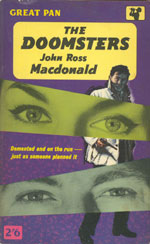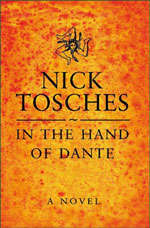Like A Son Of A Bitch
| |

| I've been reading little except Ross Macdonald novels of late. Macdonald is one of those names I scribbled in a notebook several years ago; one of the names that used to crop up as a reference point when I was exploring other writers like Chandler, Hammett, Goodis. Jim Thompson. I'm glad I made that note. I'm glad I managed to dig out some of his books, because for me he's right up there on the top shelf, alongside those aforementioned bona-fide greats.
If you're searching the second hand stores you can find several of his books published under a variety of names; Ross Macdonald, John Ross Macdonald, and even a few under his real name of Kenneth Millar. Most of these will be Lew Archer novels, and as well as being a fine place to start exploring Macdonald's output, the Archer series is simply one of the greatest detective series ever, up there with Marlowe and Scudder. Is in fact one of the greatest series ever, regardless of genre. The notion of series is important. It's important because series suggests formula, and of course the importance of formula should never be underestimated. Look what it did for Motown, Felt and Mark Rothko. With formula the interest becomes seeking out the subtle differences, rejoicing in the details and the moment of the moment. Ross Macdonald novels are like this, and its one of the reasons I love them so much. Of course I'm missing out on the original context. I often wonder about this. I often tell myself to stockpile Macdonald's books and to not read the next one until at least a year has passed, thereby mirroring the way in which the books would have been experienced within their original context: looking forward with eager anticipation to the next instalment, to see what Lew would be up to next. I wonder if I'd think differently about them. I'm sure I would. Maybe I would love them more. I'm sure I would love them no less. But of course I am too impatient to discover the answer and instead I keep consuming them, one after the other, week in week out. Or, in the holiday period, day in day out. |

| If you live in the UK it seems almost impossible to pick up much of Macdonald's output, although the fine people at Cannongate have published The
Chill and The Drowning Pool in the last couple of years. Both are excellent Archer novels and great ways in. If you want to explore the rest of the Archer series however, you're better off living in the USA, where almost all of the series has been recently published by Black Lizard / Vintage Crime. If you want to do things in the right order, you should start with The
Moving Target. Raymond Chandler said this book was pretentious and rather repellent when it first appeared in 1949, but he was probably just watching his back and a bit grumpy because Macdonald was clearly borrowing from his own back catalogue, notably The
Big Sleep, to which Moving Target is clearly indebted. But then what writer of crime fiction hasn't owed something to Chandler? And isn't it true that immature writers plagiarise and mature ones steal? Macdonald stole more than a slice of style too of course. In a masterful post-modernist nod, Lew Archer was lifted wholesale, rising phoenix-like from the early exit he made from Hammett's classic Maltese Falcon. The Moving Target is a fine start to a great series, and Paul Newman stepped into Archer's shoes in the late ´60s to star in a movie adaptation of the book (and then again a few years later in an adaptation of The Drowning Pool). That first movie is simply called Harper, and it's fine stuff, although for me Newman is far too handsome and clean cut for my Archer (or Harper, if you will), and really the only time I ever feel that Macdonald's character approaches Newman's chiselled good looks is in 1958's great The Doomsters. It's a terrific title and helps mark the point at which the Archer novels really begin to move on from the formula of the first few books and develop a deeper fascinating with the family unit and all its potentially nasty foibles. From here on, the Lew Archer novels paint a fairly uniformly bleak picture of families self-destructing, usually with money as the root of the evil that tears them apart. Macdonald's novels throughout the ´50s and ´60s are certainly far from the airbrushed depictions of happy-family suburbia so beloved of the time. There are a few great Macdonald novels to dig out aside from the Archer series, although you'll need to root around in the second hand stores to get your hands on them. Of course this means you can get them with those terrific ´50s and ´60s covers, bound in artwork that seems so much more evocative than the tastefully bland contemporary covers. Best of the bunch would be 1953's Meet Me At The Morgue (also published as Experience With Evil) and the breakneck, unremittingly seedy Blue City which was filmed in the ´80s with Judd Nelson and Ally Sheedy. Anthony Boucher of The New York Times Book Review once said that Ross Macdonald could ´write like a son of a bitch'. He wasn't wrong. |

|
I did take time out from devouring
Macdonald to check out Soul
Circus (Orion), the recent offering from George P. Pelecanos. To be
honest I did it more from a sense of duty than anything else, not having
been particularly stirred by the previous novels featuring Derek Strange
and Terry Quinn (Right
as Rain and Hell To Pay). Of course both of those previous
books were pretty good, they just didn't scale the heights I'd come to expect
from Pelecanos on the evidence of the likes of the previous Washington Quartet (Big
Blowdown, King Suckerman, The Sweet Forever and Shame
The Devil) and the Nick Stefanos trilogy (now collected in one paperback
volume by Orion). In those previous efforts Pelecanos at times scaled dizzy
peaks
and had me often thinking that if pushed to choose a contemporary writer
as a favourite, I'd choose this Washington, D.C. dweller with a soul and
spirit as fiery as the musical heroes he so often pitched into his books.
Of course it's difficult to pepper novels with musical reference. I can think of no others who do it as well as Pelecanos; can in fact think of no others who really have ever gotten away with it at all, with a notable exception being made for Alan Warner's Marvern Callar. I don't know why it's so difficult to weave music into a novel. Maybe it's just me, acutely tuned to the references, ready to pounce and be unforgiving of an out of place nod. Not that Pelecanos' nods are ever anything but spot on. From D.C. hardcore to soul, funk and country, the names he drops are always spot on and always a delight. Pelecanos' real strength, though, has always been in his ability to write dialogue in a way that you almost don't even notice it's words on a page. It helps his characters become so much more concrete, like figures on the movie screen of your minds eye, carefully coloured in and as real as the flesh and blood around you on the streets. It's clear that Pelecanos cares deeply about his characters, cares deeply about his city and about the political and social situations that mould the reality on which he forms his fiction. He writes with a gritty, steely glare that is always tempered with warmth and caring, and his real heroes are like those characters Wildfower waxed lyrically about on St Etienne's Finisterre album: ´soft but strong'. And as you turn the last pages of Soul Circus you cant help but wonder if Pelecanos was thinking about Dexys, and those lines that kick off Searching For The Young Soul Rebels. I know they were in my head. George P. Pelecanos can write like a son of a bitch. |

| Nick Tosches can write
like a son of a bitch too, and he proves it in parts of In The Hand of
Dante (No Exit), specifically with his measured depictions of the Mafiosi in New
York, dealing death and despair with a chilling flick of the wrist. With
such passages Tosches shows that he can be inch perfect in his prose, so
it's doubly unfortunate that in other parts of the same book he proves that he can write like a self-important bore. Of course that's all to do with identity; the question of who is who and what is what ripples through this book from top to bottom, leaving behind an intriguing blend of fact and fiction, truth and lies. Tosches himself stars, with large tracts given over to what one might assume (rightly or wrongly, it's never entirely clear and one suspects that's the whole point) are musings and diatribes on his own life thus far. Pot shots at the state of contemporary publishing practices might be spot-on, but instead of coming over as an idealist out to effect some kind of change, Tosches instead just comes over as a grumpy old git who is too scared and lazy to break out from the vicious circle. At least he's honest about it, I suppose, admitting it's all about money (and booze and drugs and broads), and he's all about money (and booze and drugs and broads), so... Or at least the Nick Tosches in the book is all about money (and booze and drugs and broads). Whether that means Nick Tosches is too is up to you to decide, although a glance at his ´real' life
would suggest that it largely is, or has been in the past and may yet again
be in the future. Like I said, this book is all about the questions of fact
and fiction, truth and lies. The book is also about Tosches' (and/or Tosches') obsession with Dante, and whilst the passages where the Mafia's interest in the newly discovered manuscript of The Divine Comedy are cut to the bone stuff, the lengthy rambles on numerology and (un-translated) Latin verse are not; come across instead as the petulant revenge of a writer who wants to show off. Which, again, is maybe the point. In The Hand of Dante is ultimately infuriating because it cloaks some great accessible (and well written) prose within pretentious rambling, as though Tosches is desperate to show that although he can write like a son of a bitch, he can also be an ´intelligent' writer. As if that really matters. Alistair Fitchett |